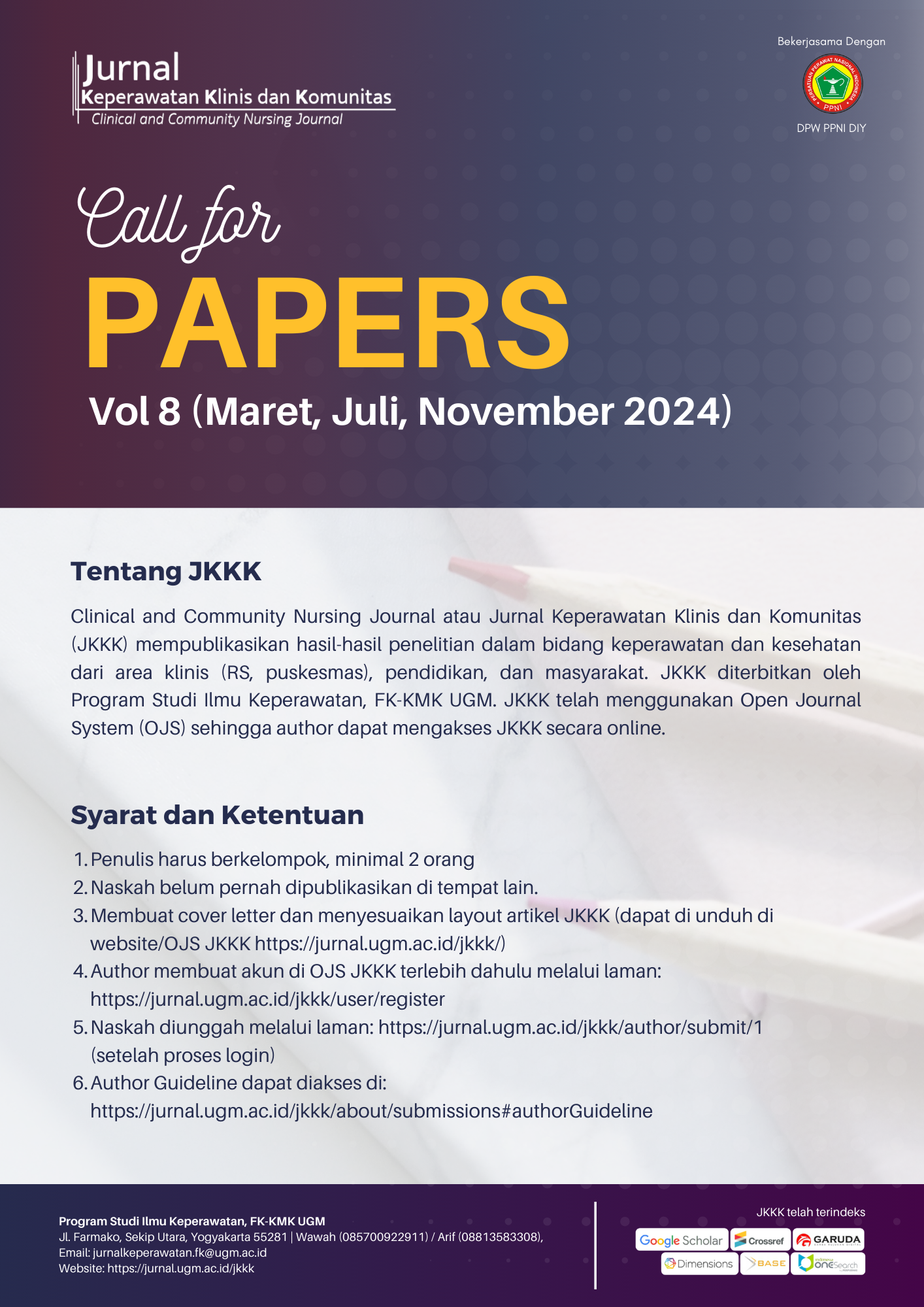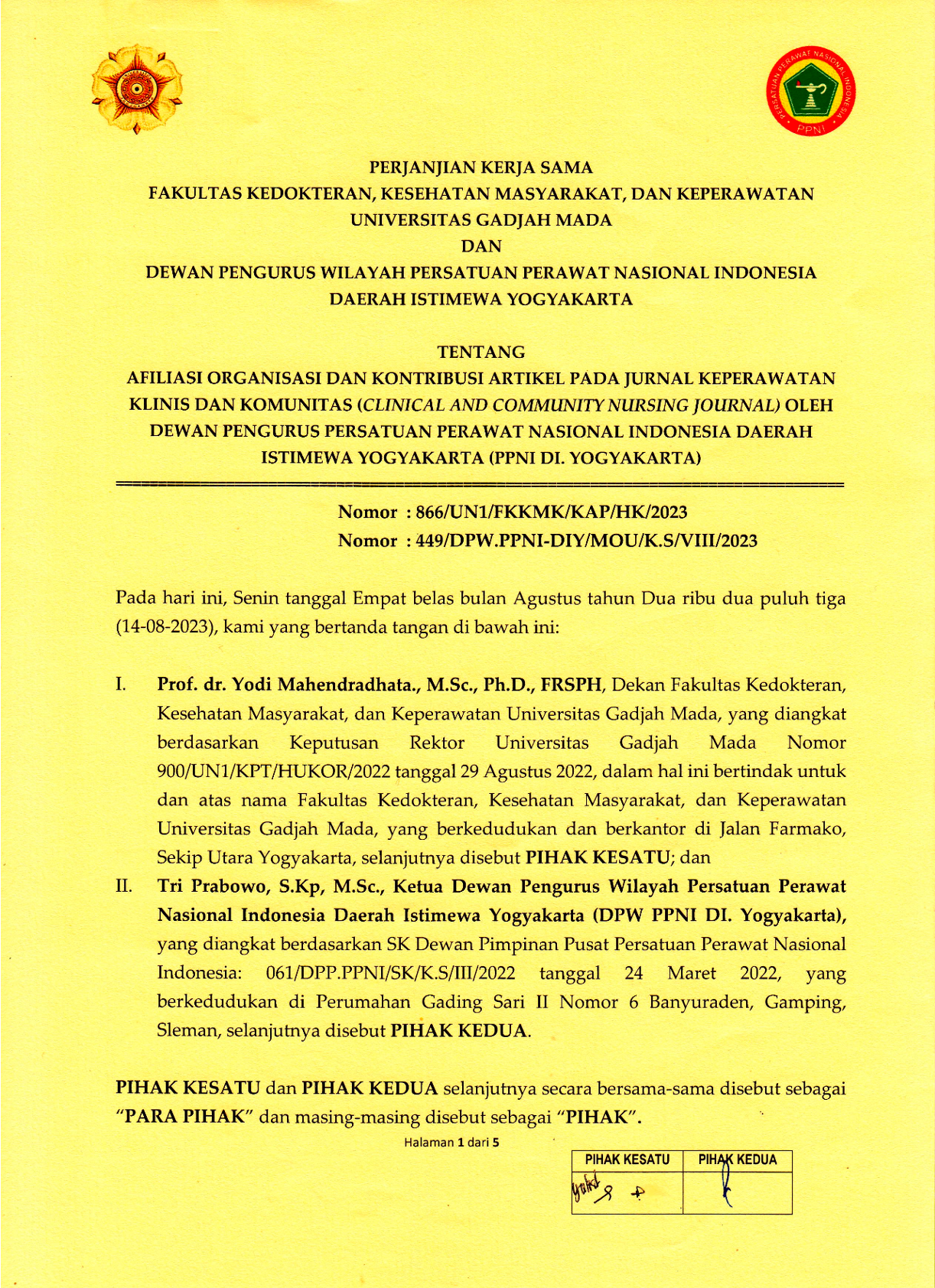Gambaran Tingkat Pengetahuan dan Praktik Siswi Boarding School Mengenai Higiene Menstruasi Area Urban di Yogyakarta
Dewi Fatma Mutiawati(1*), Widyawati Widyawati(2), Wenny Artanty Nisman(3)
(1) Badan Penyelenggara Jaminan Sosial (BPJS) Kesehatan Yogyakarta
(2) Departemen Keperawatan Anak dan Maternitas, Fakultas Kedokteran, Kesehatan Masyarakat, dan Keperawatan, Universitas Gadjah Mada
(3) Departemen Keperawatan Anak dan Maternitas, Fakultas Kedokteran, Kesehatan Masyarakat, dan Keperawatan, Universitas Gadjah Mada
(*) Corresponding Author
Abstract
Background: The density of students’ activities in boarding school needs to get care, especially in the practice of personal hygiene during menstruation. Menstruation process can lead to germs infection on the genital area which may cause diseases to the reproductive tract. To prevent this problem, it is important to do proper menstrual hygiene.
Objectives: To identify the account of a boarding school student girls’ level of knowledge and practice of Menstrual Hygiene in an urban area of Yogyakarta.
Method: This study was a quantitative descriptive using cross-sectional approach. The research was conducted in February 2017. The population of the research was female students’ boarding school in an urban area of Yogyakarta; where 124 female students were recruited for samples. Questionnaire was used as the data collection technique. Statistic descriptive technique was used for data analysis.
Results: In general, respondents’ knowledge and practice of menstrual hygiene were good. Almost all respondents (98%) answered correctly on menstruation statements as normal and statements with many incorrect answers were menstruation as a sign of puberty. The practice of menstrual hygiene is most often done by respondents bathing more than once a day during menstruation (99,2%). As for the practice of menstrual hygiene which is still not quite right, namely the direction of cleaning the pubic area (45,2%).
Conclusion: Respondents have accurate knowledge about menstrual hygiene. School manager (counseling and knowledge department) can increase the inappropriate menstrual knowledge and hygiene practice regarding to: hormones that affect menstruation, menstrual period, the frequency of replacement of the pads, the selection of material for disposing the pads and choosing right places to dry the underwear.
ABSTAK
Latar belakang: Padatnya aktivitas siswi di boarding school perlu mendapat perhatian terutama dalam penerapan kebersihan diri saat menstruasi. Proses menstruasi dapat mengakibatkan area genetalia rentan terinfeksi kuman sehingga menimbulkan penyakit saluran reproduksi. Untuk mencegah terjadinya permasalahan pada organ reproduksi maka perlu memperhatikan higiene menstruasi.
Tujuan: Mengetahui gambaran tingkat pengetahuan dan praktik pada siswi boarding schoolmengenai higiene menstruasi area urban di Yogyakarta.
Metode: Jenis penelitian ini adalah kuantitatif deskriptif dengan pendekatan cross sectional. Penelitian dilaksanakan pada Februari 2017. Populasi penelitian adalah siswi di boarding schoolarea urban di Kota Yogyakartadengan besar sampel 124 siswi. Pengambilan data menggunakan kuesioner praktik higiene menstruasi. Data dianalisis dengan teknik statistik deskriptif.
Hasil: Secara umumpengetahuan dan praktik higiene menstruasi responden sudah baik. Hampir semua responden (98%) menjawab tepat pada pernyataanmenstruasi sebagai hal yang normal dan pernyataan dengan banyak jawaban yang salah adalah menstruasi sebagai tanda masuknya masa pubertas. Praktik higiene menstruasi yang paling seringdilakukan oleh responden mandi lebih dari satu kali sehari pada saat menstruasi(99,2%). Sementara untuk praktik higiene menstruasi yang masih kurang tepat yaitu arah membersihkan daerah kemaluan(45,2%).
Kesimpulan: Responden memiliki pengetahuan yang tepat terkait pengetahuan higiene menstruasi. Bagi pengelola sekolah pada bidang bimbingan dan konseling dapat meningkatkan pengetahuan serta praktik higiene menstruasi terhadap aspek yang kurang tepat seperti hormon yang mempengaruhi menstruasi, periode menstruasi, frekuensi penggantian pembalut, pemilahan wadah dalam pembuangan pembalut, dan tempat menjemur celana dalam.
Keywords
Full Text:
PDFReferences
- World Heatlh Organization. Developing a report "Health for the world's adolescents" [Internet]. 2014 [diakses pada 2016, 05 Maret]. Diakses dari: http://www.who.int/maternal_child_adolescent/topics/adolescence/second-decade/en/
- Kementerian Kesehatan Republik Indonesia. Pusat Data Informasi Kesehatan Indonesia Tahun 2013. Jakarta: Kemenkes RI; 2014.
- Kusmiran, E. Kesehatan Reproduksi Remaja dan Wanita. Jakarta: Salemba Medika; 2014.
- Kusniyati, N. Perilaku Hidup Bersih dan Sehat (PHBS) terkait Menstruasi antara Remaja yang Bersekolah di SMP yang Terletak di Desa dan Kota [Skripsi]. Yogyakarta: Fakultas Kedokteran, Kesehatan Masyarakat, dan Keperawatan Universitas Gadjah Mada; 2011.
- ICSU, ISSC. Review of the Sustainable Development Goals: The Science Perspective. Paris: International Council for Science (ICSU); 2015.
- Umar, M.L., Yusuf, N. W., Musa, A. B. Menstruation and Menstrual Hygiene amongst Adolencent School Girls in Kano, Northwestern Nigeria. African Journal of Reproductive Health. 2010; 14(3): 201.
- World Health Organization. Strengthening the health sector response to adolescent health and development [Internet]. 2009 [diakses pada 14 Mei 2016]. Diakses dari: http://www.who.int/...adolescent.../cah_adh_flyer_ 2010_12_en.pdf
- Dinas Pendidikan, Pemuda, dan Olahraga Propinsi DIY. Rangkuman Data Pendidikan: Jumlah Siswi Sekolah Asrama 2015/2016. Yogyakarta: Dinas Dikpora DIY, 2017.
- Kementerian Kesehatan Republik Indonesia. Profil Kesehatan Indonesia Tahun 2013. Jakarta: Kemenkes RI; 2014.
- Kementerian Kesehatan Republik Indonesia. Infodatin Pusat Data dan Informasi Kementerian Kesehatan RI. Jakarta: Kemenkes RI; 2014.
- Gultie, T., Hailu, D., Workineh, Y. Age of Menarche and Knowledge about Menstrual Hygiene Management among Adolescent School Girls in Amhara Province, Ethiopia: Implication to Health Care Workers & School Teachers. PLoS ONE. 2014; 9(9): e108644. doi:10.1371/journal.pone.0108644.
- Thakre, S.B., Thakre, S.S., Reddy, M., Rathi, N., Pathak, K., Ughade, S. Menstrual Hygiene: Knowledge and Practice among Adolescent School Girls of Saoner, Nagpur District. Journal of Clinical and Diagnostic Research. 2011; 5(5): 1027-1033.
- Shanbhag, D., Shilpa, R., D’Souza, N., Josephine, P., Singh, J. Perceptions regarding menstruation and practices during menstrual cycles among high school going adolescent girls in resource limited settings around Bangalore city, Karnataka, India. International Journal of Collaborative Research on Internal Medicine & Public Health. 2012; 4(7): 1353–1362.
- Lawan, U.M. Menstruation and Menstrual Hygiene amongst Adolescent School Girls in Kano, Northwestern Nigeria. African Journal of Reproductive Health.2010. 14(3): 201–207.
- Adhikari, P., Kadel, B., Dhungel, S.l., Mandal, A. Knowledge and Practice Regarding Menstrual Hygiene in Rural Adolescent Girls of Nepal. Kathmandu University Medical Journal. 2007; 5(3): 382–386.
- Burnet Institute. Menstrual Hygiene Management in Indonesia. Understanding, Practice, Determinant, and Impact among Adolescent School Girl. Australia: Burnet Institute; 2015
- Dhingra, R., Kumar, A., and Kour, M. Knowledge and Practices Related to Menstruation among Tribal (Gujjar) Adolescent Girls. Ethnomedicine. 2010; (3):43– 48.
- Madhusudan, M., Chaluvaraj, T. S., Chaitra, M. M., Ankitha, S., Pavithra, M., & Urthy, T. M. Menstrual hygiene: Knowledge and practice among secondary school girls of Hosakote, rural Bangalore. International Journal of Basic and Applied Medical Sciences. 2014; 313-320.
- Rahmatika, D. Pengaruh Pengetahuan dan Sikap tentang Personal Higiene Menstruasi terhadap Tindakan Personal Higiene Remaja Puteri pada Saat Menstruasi di SMK Negeri 8 Medan Tahun 2010 [Skripsi]. Fakultas Kesehatan Masyarakat Universitas Sumatera Utara Medan; 2011.
- House, S., Mahon, T., Cavill, S. Menstrual Hygiene Matters A Resource for Improving Menstrual Hygiene Around the World [Internet]. 2012 [diakses pada 18 Juli 2016]. Diakses dari www.wateraid.org/~/media/Files/Global/ MHM%20files/Compiled_LR.pdf.
- United Nations International Children’s Emergency Fund. Adolescene an Age of Opportunity [intenet]. 2011 [diakses pada 14 Mei 2016]. Diakses dari http://www.unicef.org/adolescence/files/SOWC_2011_Main_Report_ EN_02092011.pdf
- Nair, R., Shah, P.P., Modi, D.K., Desai, S.A., Desai, L. Improving Quality of Life with New Menstrual Hygiene Practices among Adolescent Tribal Girls in Rural Gujarat, India. Reprod Health Matters. 2008; 21: 205–213. doi:10.1016/S0968-8080(13)41691-9.
- Hamed, A.G. The Impact of Genital Hygiene Practices on the Occurrence of Vaginal Infection and Development of a Nursing Fact Sheet as Prevention Massage for Vulnerable Women. IOSR Journal of Nursing a nd Health Science (IOSR-JNHS). 2015; 4(6): 55-64. e-ISSN: 2320–1959.p- ISSN: 2320–1940. DOI: 10.9790/1959-04655564.
- El-Gilany, A., Badwi, K., El-Fedawy, S. Menstrual Hygiene among Adolescent School Girls in Mansoura, Egypt. Reproductive Health Matters. 2005; 13(26): 147-52.
- Sari, E., Santoso, E.J., Sayono. Pengaruh Pendidikan Kesehatan tentang Hygiene Saat Menstruasi terhadap Pengetahuan dan Keterampilan Remaja Putri dalam Merawat Perineum Saat Menstruasi [Karya Ilmiah]. Semarang: STIKES Telogorejo Semarang; 2010.
- Iqbal K, Amena Rahim, and Hafza Ahmed. Comparison of Scalp Hair Changes on the First and Fifth Day of Normal Menstrual Cycle in Young Females. Isra Medical Journal. 2015; 7(1).
- Hilber, A.M., Francis, S.C., Chersich, M., Scott, P., Redmond, S., Ben-der, N., Miotti, P., Temmerman, M., Low, N. Intravaginal Prac-tices, Vaginal Infections and HIV Acquisition: Systematic Review and Meta-Analysis. PLoS One, 5. 2010; (2). e9119. ISSN 1932-6203 DOI: 10.1371/journal.pone.0009119.
- Patle, R., Sanjay, K. Comparative Study on Menstrual Hygiene in Rural and Urban Adolescent. International Journal of Medicine and Public Health. 2013. 10.5455/ijmsph.2013.161020133.
- Omidvar, S., Begum, K. Factors Influencing Hygienic Practices during Menses among Girls from South India-A Cross Sectional Study. International Journal of Collaborative Research on Internal Medicine & Public Health. 2010; 2(12):411
Article Metrics
Refbacks
- There are currently no refbacks.
Copyright (c) 2017 Dewi Fatma Mutiawati, Widyawati, Wenny Artanty Nisman

Jurnal Keperawatan Klinis dan Komunitas (Clinical and Community Nursing Journal)
collaborates with DPW PPNI DIY
![]()
Jurnal Keperawatan Klinis dan Komunitas (Clinical and Community Nursing Journal) is licensed under a Creative Commons Attribution-ShareAlike 4.0 International License.





